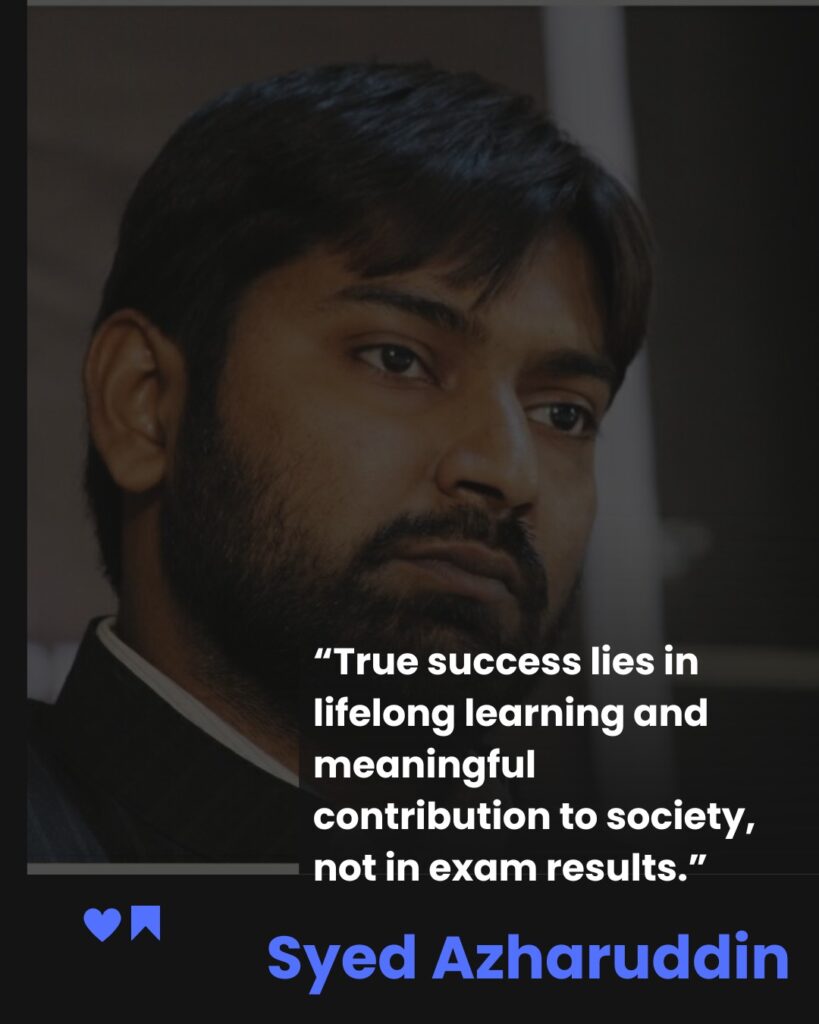
Syed Azharuddin
I recently had the privilege of engaging with parents and children of Indian expatriates in Saudi Arabia through an insightful online session organized by the IIPA. The discussion centered around a topic of immense relevance to students and their families – managing exam stress. This interactive session revealed that exam stress extends beyond academics, touching on emotions, expectations, and overall student well-being. Recognizing that some could not attend, I felt it imperative to document the key takeaways to benefit a broader audience.
Examinations have long been integral to the education system, serving as a metric for assessing students’ comprehension and academic progress. However, excessive exam-related stress can lead to anxiety, diminished performance, and a negative learning experience. To address this, it is essential to shift our perspective from mere assessment to the true essence of education – acquiring knowledge, developing skills, and making meaningful contributions to society.
Purpose of Examinations
Exams are intended to evaluate students’ understanding and ensure they meet academic standards. Paul Ramsden, in Learning to Teach in Higher Education (1992), aptly notes, “Assessment is the engine that drives student learning,” highlighting how exams shape study habits and motivation. Additionally, Biggs and Tang, in Teaching for Quality Learning at University (2011), observe, “Assessment defines what students regard as important, how they spend their time, and how they come to see themselves as students and professionals.” While structured assessments are valuable, they are not the sole indicators of intelligence or success.
Education Beyond Exams
The broader objective of education transcends examinations and degrees. Ronald Barnett, in The Idea of Higher Education (1990), asserts that higher education should foster critical thinking, adaptability, and lifelong learning. The Quran echoes this sentiment, stating, “Are those who know equal to those who do not know?” (Surah Az-Zumar, 39:9), emphasizing that education is about enlightenment and wisdom, rather than mere academic validation. The Prophet Muhammad ﷺ reinforced the significance of knowledge, proclaiming, “The best among you are those who learn and teach.” (Sahih al-Bukhari). These perspectives underscore that true education is about learning, understanding, and applying knowledge in real life.
The Pitfalls of Exam Stress
Education is a lifelong journey of acquiring knowledge and contributing to society. Undue exam stress is counterproductive, often stemming from performance pressure, fear of failure, and societal expectations. If success is rooted in learning and skill development, exams should not be viewed as the ultimate measure of one’s capabilities. A balanced approach involves preparation, with the understanding that real success lies in applying knowledge meaningfully.
Effective Strategies for Managing Exam Stress
- Adopting a Growth Mindset: Viewing exams as opportunities to consolidate knowledge. Carol Dweck, in Mindset: The New Psychology of Success (2006), emphasizes a “growth mindset,” where intelligence is developed through effort and perseverance.
- Time Management and Organisation: Effective planning and structured study schedules reduce anxiety. Prioritizing topics based on importance and difficulty allows better focus and preparation.
- Healthy Lifestyle Choices: Adequate sleep, nutrition, and regular physical activity are crucial for cognitive function and stress management. The Prophet Muhammad ﷺ advocated balance in all aspects of life, a principle applicable to maintaining well-being during exams.
- Mindfulness and Relaxation Techniques: Practices such as deep breathing, meditation, offering Salah, and short breaks during study sessions can alleviate anxiety. Research indicates that mindfulness techniques enhance focus and academic performance.
- Seeking Support and Encouragement: Family, teachers, and peers play a vital role in fostering a positive learning environment. Encouragement and open discussions about exam-related stress provide necessary support.
While exams are an aspect of the education system, they should not define one’s learning experience. The essence of education lies in acquiring knowledge, critical thinking, and meaningful societal contributions. True success is based on education and the pursuit of knowledge, not merely academic validation. Therefore, students should focus on skill development, knowledge application, and embracing lifelong learning as measures of success in both personal and professional life.








